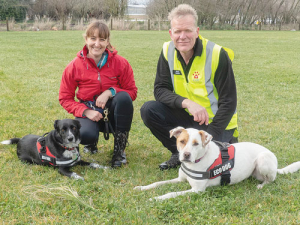Dealing with a prick of a grass
This is a busy time of year on the Mount Beautiful Vineyard, at Spotswood, North Canterbury.
 Fiona Thomson with Tahi and Geoff Bowers with Nala during a Chilean needle grass detection training session near Christchurch.
Fiona Thomson with Tahi and Geoff Bowers with Nala during a Chilean needle grass detection training session near Christchurch.
A Canterbury researcher using dogs trained to track down the pasture pest Chilean needle grass is hoping to consolidate and expand the project after a successful proof-of-concept season.
Fiona Thomson and her dog Tahi have been joined by dog trainer Geoff Bowers and Nala, and they have shown how the animals can reliably pinpoint plants in the wild.
“This was a proof of concept. This summer we will be out there solidifying the concept and training trainers,” Thomson told Rural News.
This project is independent of her work as a research associate with Landcare Research.
Tahi, a border collie-cross, was adopted from the SPCA.
“She’s a working dog so I wanted her to work,” Thomson explained.
Having heard of dogs being used for similar work overseas, Thomson floated the idea of Chilean needle grass detection with Bowers, who she’d taken Tahi to for general obedience training.
Bowers, a Brit with 25 years experience in dog handling in the British and New Zealand police, was so sold on the idea that he brought his own dog Nala into the project.
It also came at the right time for ECan, which is helping fund them. The dogs have spent seven days in the field so far, for the Marlborough regional council and ECan.
Chilean needle grass is a pasture pest that spreads by needle-sharp barbed seeds which work into the fleece and flesh of stock, causing suffering and reducing meat, pelt and wool value. The seeds are not easily windborne, but spread by attaching to anything that brushes past them including machinery, vehicles, stock, hay and footwear or clothing.
The main infestation areas are in Hawkes Bay and Marlborough and it was discovered in North Canterbury about 2008.
Thomson says Chilean needle grass is very difficult for humans to identify before the seed head appears, at which point it is already in seed. Chilean needle grass carries a second seed pod hidden in the stem.
Thomson says the dogs work best when only a few individual plants are there to find in an area.
“This is really exciting where you’ve got a new incursion of a weed species, or if you’ve done control and you want to mop up the last few individuals, or if you’ve got a centre population that’s spreading out,” she adds. “That’s where it’s hard for people to see them, and it takes a long time to find them.”
Last season, the dogs identified one plant at a Canterbury property that was only confirmed as Chilean needle grass after it was dug up and sent for analysis.
“So what we’re hoping now this season is to get out there and expand and actually survey properties properly and find some plants.”
The dogs have also been trained for velvetleaf, demonstrating the ability to locate a small sample leaf from 30m away, then scanning a 5ha fodder beet field to show it was clean, in only 90 minutes.
Bowers says recent research shows dogs can detect as little as one part per trillion and differentiate between three million different smells.
“We know they can find viruses,” he says.
The dogs could be trained to scan a herd of cattle for Mycoplasma bovis. “I have to see if I can access a funding grant for it,” Thomson adds. “I don’t see why it couldn’t be done.”
Phoebe Scherer, a technical manager from the Bay of Plenty, has won the 2025 Young Grower of the Year national title.
The Fencing Contractors Association of New Zealand (FCANZ) celebrated the best of the best at the 2025 Fencing Industry Awards, providing the opportunity to honour both rising talent and industry stalwarts.
Award-winning boutique cheese company, Cranky Goat Ltd has gone into voluntary liquidation.
As an independent review of the National Pest Management Plan for TB finds the goal of complete eradication by 2055 is still valide, feedback is being sought on how to finish the job.
Beef + Lamb New Zealand has launched an AI-powered digital assistant to help farmers using the B+LNZ Knowledge Hub to create tailored answers and resources for their farming businesses.
A tiny organism from the arid mountains of mainland Greece is facilitating a new way of growing healthier animals on farms across New Zealand.

OPINION: For years, the ironically named Dr Mike Joy has used his position at Victoria University to wage an activist-style…
OPINION: A mate of yours truly has had an absolute gutsful of the activist group SAFE.